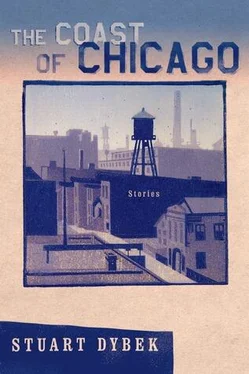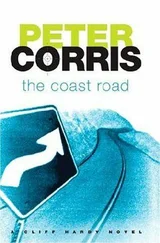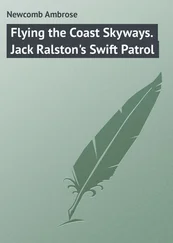Still, in a way, I could see it from Ziggy’s point of view. Mayor Daley was everywhere. The city was tearing down buildings for urban renewal and tearing up streets for a new expressway, and everywhere one looked there were signs in front of the rubble reading:
SORRY FOR THE INCONVENIENCE
ANOTHER IMPROVEMENT
FOR A GREATER CHICAGO
RICHARD J. DALEY, MAYOR
Not only were there signs everywhere, but a few blocks away a steady stream of fat, older, bossy-looking guys emanated from the courthouse on Twenty-sixth. They looked like a corps of Mayor Daley doubles, and sometimes, especially on election days, they’d march into the neighborhood chewing cigars and position themselves in front of the flag-draped barbershops that served as polling places.
But back to blight.
That was an expression we used a lot. We’d say it after going downtown, or after spending the day at the Oak Street Beach, which we regarded as the beach of choice for sophisticates. We’d pack our towels and, wearing our swimsuits under our jeans, take the subway north.
“North to freedom,” one of us would always say.
Those were days of longing without cares, of nothing to do but lie out on the sand inspecting the world from behind our sunglasses. At the Oak Street Beach the city seemed to realize our dreams of it. We gazed out nonchalantly at the white-sailed yachts on the watercolor-blue horizon, or back across the Outer Drive at the lake-reflecting glass walls of high rises as if we took such splendor for granted. The blue, absorbing shadow would deepen to azure, and a fiery orange sun would dip behind the glittering buildings. The crowded beach would gradually empty, and a pitted moon would hover over sand scalloped with a million footprints. It would be time to go.
“Back to blight,” one of us would always joke.
I remember a day shortly after blight first became official. We were walking down Rockwell, cutting through the truck docks, Zig, Pepper, and I, on our way to the viaduct near Douglas Park. Pepper was doing his Fats Domino impression, complete with opening piano riff: Bum-pah-da bum-pa-da dummmmm…
Ah foun’ mah thrill
Ahn Blueberry Hill…
It was the route we usually walked to the viaduct, but since blight had been declared we were trying to see our surroundings from a new perspective, to determine if anything had been changed, or at least appeared different. Blight sounded serious, biblical in a way, like something locusts might be responsible for.
“Or a plague of gigantic, radioactive cockroaches,” Zig said, “climbing out of the sewers.”
“Blight, my kabotch,” Pepper said, grabbing his kabotch and shaking it at the world. “They call this blight? Hey, man, there’s weeds and trees and everything, man. You shoulda seen it on Eighteenth Street.”
We passed a Buick somebody had dumped near the railroad tracks. It had been sitting there for months and was still crusted with salt-streaked winter grime. Someone had scraped WASH ME across its dirty trunk, and someone else had scrawled WHIP ME across its hood. Pepper snapped off the aerial and whipped it back and forth so that the air whined, then slammed it down on a fender and began rapping out a Latin beat. We watched him smacking the hell out of it, then Zig and I picked up sticks and broken hunks of bricks and started clanking the headlights and bumpers as if they were bongos and congas, all of us chanting out the melody to “Tequila.” Each time we grunted out the word tequila , Pepper, who was dancing on the hood, stomped out more windshield.
We were revving up for the viaduct, a natural echo chamber where we’d been going for blues-shout contests ever since we’d become infatuated with Screamin’ Jay Hawkins’s “I Put a Spell on You.” In fact, it was practicing blues shouts together that led to the formation of our band, the No Names. We practiced in the basement of the apartment building I lived in: Zig on bass, me on sax, Pepper on drums, and a guy named Deejo who played accordion, though he promised us he was saving up to buy an electric guitar.
Pepper could play. He was a natural.
“I go crazy,” was how he described it.
His real name was Stanley Rosado. His mother sometimes called him Stashu, which he hated. She was Polish and his father was Mexican — the two main nationalities in the neighborhood together in one house. It wasn’t always an easy alliance, especially inside Pepper. When he got pissed he was a wild man. Things suffered, sometimes people, but always things. Smashing stuff seemed to fill him with peace. Sometimes he didn’t even realize he was doing it, like the time he took flowers to Linda Molina, a girl he’d been nuts about since grade school. Linda lived in one of the well-kept two-flats along Marshall Boulevard, right across from the Assumption Church. Maybe it was just that proximity to the church, but there had always been a special aura about her. Pepper referred to her as “the Unadulterated One.” He finally worked up the nerve to call her, and when she actually invited him over, he walked down the boulevard to her house in a trance. It was late spring, almost summer, and the green boulevard stretched like an enormous lawn before Linda Molina’s house. At its center was a blazing garden of tulips. The city had planted them. Their stalks sprouted tall, more like corn than flowers, and their colors seemed to vibrate in the air. The tulips were the most beautiful thing in the neighborhood. Mothers wheeled babies by them; old folks hobbled for blocks and stood before the flowers as if they were sacred.
Linda answered the door and Pepper stood there holding a huge bouquet. Clumps of dirt still dangled from the roots.
“For you,” Pepper said.
Linda, smiling with astonishment, accepted the flowers; then her eyes suddenly widened in horror. “You didn’t—?” she asked.
Pepper shrugged.
“ Lechón! ” the Unadulterated One screamed, pitching a shower of tulips into his face and slamming the door.
That had happened a year before and Linda still refused to talk to him. It had given Pepper’s blues shouts a particularly soulful quality, especially since he continued to preface them, in the style of Screamin’ Jay Hawkins, with the words “I love you.” I love you! Aiiyyaaaaaa!!!
Pepper even had Screamin’ Jay’s blues snork down.
We’d stand at the shadowy mouth of the viaduct, peering at the greenish gleam of light at the other end of the tunnel. The green was the grass and trees of Douglas Park. Pepper would begin slamming an aerial or board or chain off the girders, making the echoes collide and ring, while Ziggy and I clonked empty bottles and beer cans, and all three of us would be shouting and screaming like Screamin’ Jay or Howlin’ Wolf, like those choirs of unleashed voices we’d hear on “Jam with Sam’s” late-night blues show. Sometimes a train streamed by, booming overhead like part of the song, and we’d shout louder yet, and I’d remember my father telling me how he could have been an opera singer if he hadn’t ruined his voice as a kid imitating trains. Once, a gang of black kids appeared on the Douglas Park end of the viaduct and stood harmonizing from bass through falsetto just like the Coasters, so sweetly that though at first we tried outshouting them, we finally shut up and listened, except for Pepper keeping the beat.
We applauded from our side but stayed where we were, and they stayed on theirs. Douglas Park had become the new boundary after the riots the summer before.
“How can a place with such good viaducts have blight, man?” Pepper asked, still rapping his aerial as we walked back.
“Frankly, man,” Ziggy said, “I always suspected it was a little fucked up around here.”
Читать дальше












